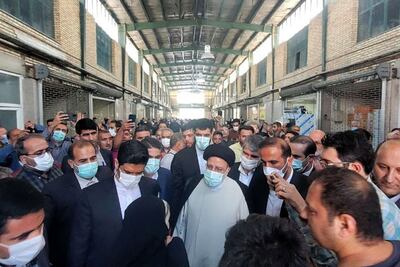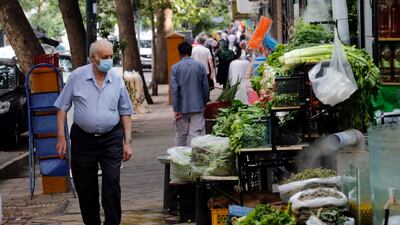Street protests across several provinces in Iran have simmered in recent days over a new cut in state subsidies for food nearly a year after President Ebrahim Raisi took office.
The Iranian government has sharply raised the price of some basic goods, such as cooking oil and flour-based staples. People in some cases outside the capital Tehran have been left scrambling to snatch loaves of bread left on the shelves in shops before the price increase.
It follows months of protests by teachers demanding better pay, working conditions and education reforms.
The latest protests come amid a crippling economic crisis and stalled negotiations with major powers over the country’s controversial nuclear enrichment.
Social media posts and footage showed protesters shouting slogans against Mr Raisi and Ayatollah Ali Khamenei, Iranian supreme leader.
In some videos circulating on Twitter, dozens of protesters were seen burning images of regime figures.
The National has authenticated footage and images, which emerged from provinces including Shahr-e Kord, the capital of Chaharmahal and Bakhtiari province, south-west of Esfahan in central Iran. The province is the scene of most of the recent protests.
Activists have accused the authorities of pursuing a heavy-handed approach to prevent protests from spreading further.
Reports that four protesters have been killed are unconfirmed. Independent media outlets have published four photos of what they claimed protesters killed by police gunfire. The National could not independently verify such claims.
On Sunday night, dozens of protesters stopped traffic on a street in Shahr-e Kord and chanted slogans against the regime.
There are reports of internet access being cut and communications disrupted in an attempt to quell protests – a tactic that has become routine in previous anti-government protests. Activists have found ways to circumvent the online shutdown as technology develops.
The recent protests were sparked by the government’s new subsidy cut that caused sharp price rises.
The price of wheat continued to jump on Friday on international markets after India banned the export of the staple cereal. Global food prices hit a record high after the Russian invasion of Ukraine in February.
What does state media say?
Iran’s state news agency IRNA said some shops were “set on fire in some cities”, prompting police to arrest scores of “provocateurs”.
State-affiliated media have quoted government sources as accusing anti-regime agents of sparking the unrest.
The government said its economic policy was aimed at achieving fair redistribution of subsidies to lower-income people, and blames US sanctions for the economic crisis.
Semi-official news agencies and newspapers said people were protesting to draw government attention to the “unfair conditions” because of the poor distribution of resources and subsidies.
They cited a figure of 10 per cent of the population – or more than eight million people – as the number of people missing out on food and fuel subsidies and echoed Mr Raisi's statements that the new measures were designed to make sure that state assistance is delivered to only those who deserve it.

The Biden administration on Sunday supported the protesters. State Department Spokesperson Ned Price described the protesters as "brave" and threw the weight of his government behind them. "We support their rights to peaceful assembly and freedom of expression online and offline - without fear of violence and reprisal," he wrote.
In 2018, former US president Donald Trump toughened US sanctions on Iran over its nuclear programme after he withdrew from a 2015 international agreement with Tehran. Talks to revive the pact under the Joe Biden administration have come to a standstill with each side blaming the other for the impasse.
This has mainly increased pressure on the country’s middle-income class and poor households.
The value of the local currency has been slashed and the purchasing power greatly diminished, which has driven more Iranians into poverty. The Covid-19 pandemic restrictions have made things worse.
Iranian political and human rights activists have also charged that poor government plays a key role in the deteriorating living conditions.
The National is unable to obtain credible official figures on poverty rates in the country with an 84 million population.
Anti-government protests are not new in Iran. In the oil-rich, south-western province of Khuzestan, regular widespread demonstrations because of economic hardships and water scarcity were held.
In July last year, mass protests were held in Khuzestan against severe water shortage amid accusations that the government was diverting water to drill for oil.
Though it admitted the water scarcity problem, the government denied it was because of drilling in the oil-rich province but rather due to sanctions as they stopped imports of key water pumps. It said heat and climate change were also factors.
There were several strikes by oil workers in dozens of companies last year over low salaries and perceived poor work conditions.
And in 2019, what began as scattered protests over a surprise increase in fuel prices quickly spread into one of the biggest rallies in the 40-year history of the Iranian republic.


